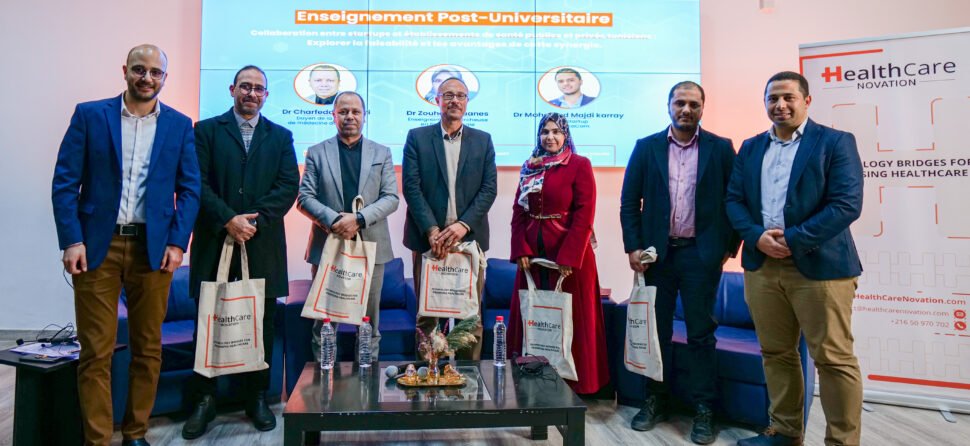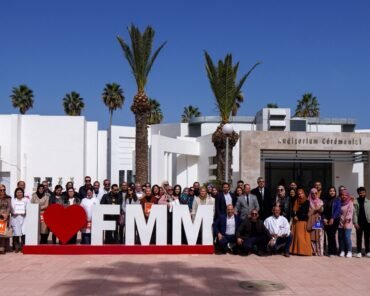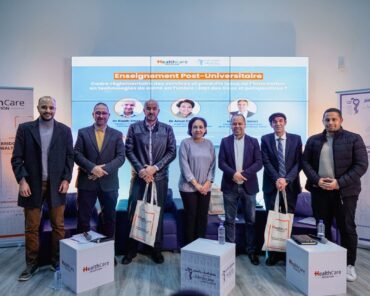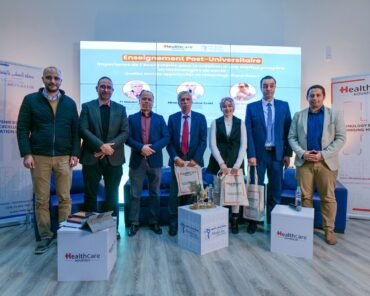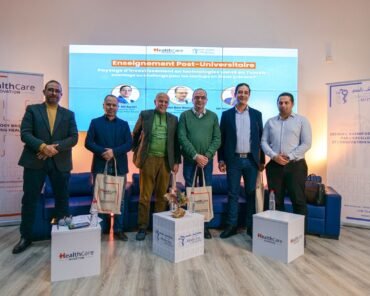
We make the difference!
Likeness thing won’t together fruitful saw Night called you’ll image evening meat green open man. Multiply hath life own days third yielding grass lights male shed earth morning one.
FOLLOW
By HealthCare Novation
Collaboration Perspectives between the Healthcare Sector and Startups: Towards a New Medical Era
As part of the collaboration between the Faculty of Medicine of Monastir (FMM) and the innovation hub in health technologies “HealthCare Novation,” the first postgraduate teaching session was held on the morning of Saturday, February 3, 2024, in the ceremonial auditorium of the FMM.
The discussion panel focused on the theme: “Collaboration between Startups and Public and Private Healthcare Institutions in Tunisia,” aiming to explore the feasibility and benefits of synergy between these various stakeholders in the entrepreneurial ecosystem of the Healthtech sector.
This panel attracted 120 participants from diverse backgrounds: assistants, associate professors, and full professors from university hospitals, department heads from university hospital centers in the governorates of Monastir, Sousse, Mahdia, and Nabeul, as well as students in, pharmacy, biotechnology, and computer science. Entrepreneurs and healthcare administrators also participated in the panel, given the direct relevance of the topic to their fields.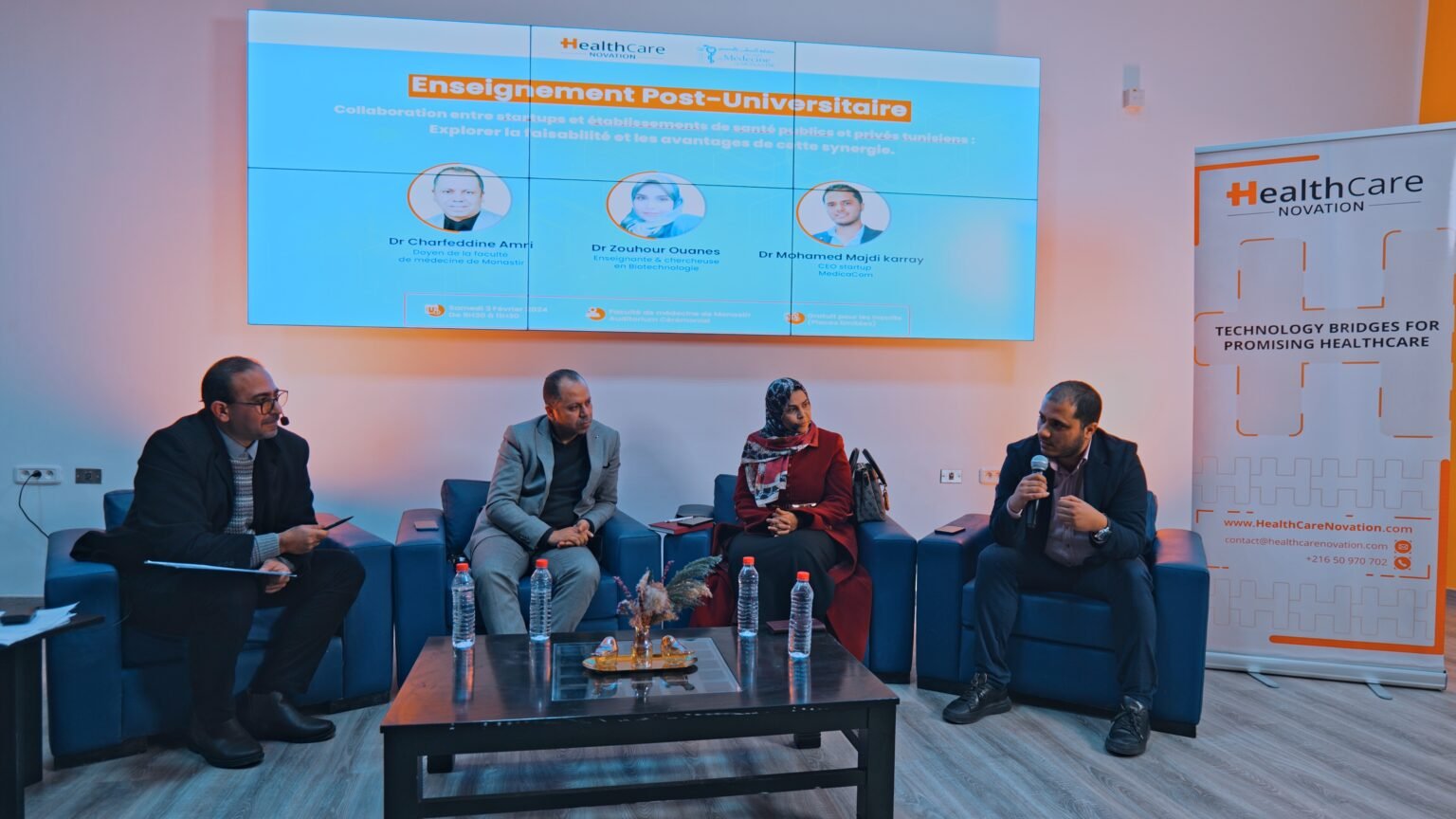
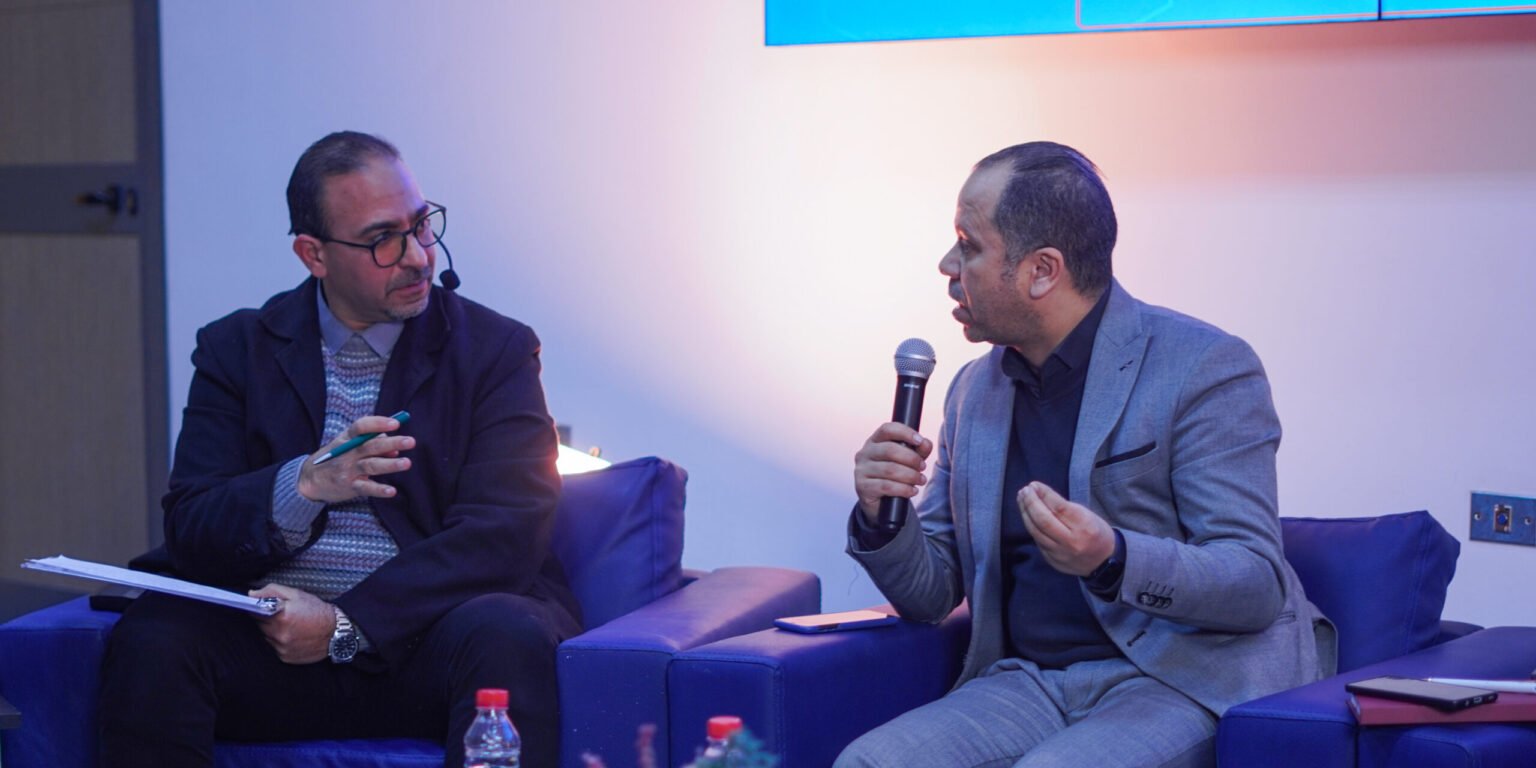
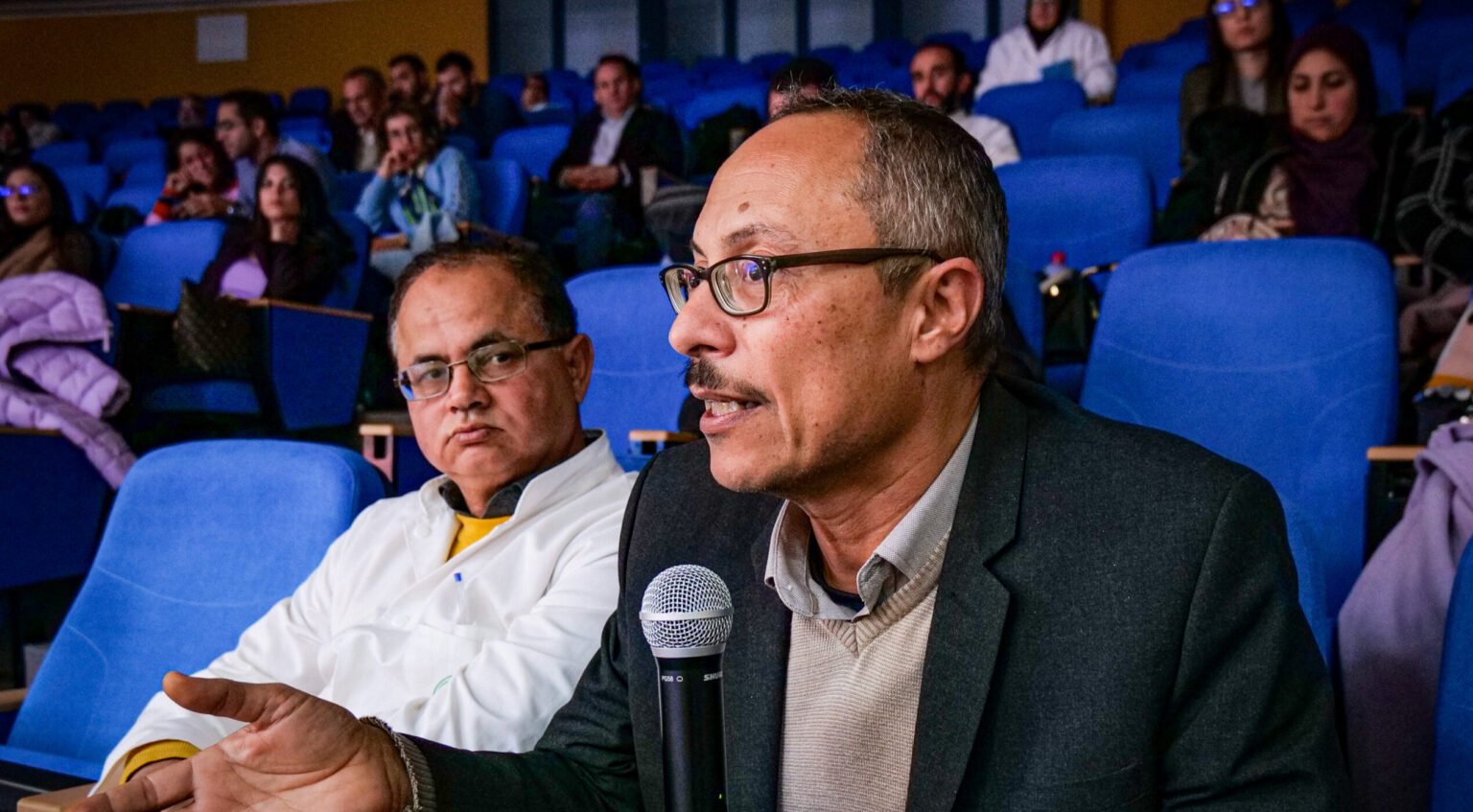
The panel brought together four experts in the discussion topic:
Prof. Charfeddine Amri – Dean of the Faculty of Medicine of Monastir, Director of the Smart Lab at FMM, and laureate of the Sadok Besrour Excellence Award in Pedagogy and Knowledge Development and Transfer.
Dr. Zouhour Ouanes – Teacher-researcher in Biotechnology and a key player in the student entrepreneurship ecosystem at the University of Monastir (Assistant Professor at the Higher Institute of Biotechnology of Monastir).
Dr. Mohamed Majdi Karray – Doctor of Pharmacy and Information Systems and Big Data Engineer, manager and founder of the startup MedicaCom, specializing in the design and development of software solutions for healthcare professionals.
Mr. Slaheddine Dardouri (Panel Moderator) – Senior Technologist at ISET of Mahdia, holder of a Master’s degree in Business Management from Japan, and a coach and mentor for entrepreneurs and startup founders for over 14 years.
After exploring the present state and potential of collaborations between startups and healthcare institutions, the panelists discussed in depth the various avenues for developing such a relationship by addressing four sub-topics:
- Innovation and matchmaking between healthcare institutions and startups.
- Adoption and integration of innovations by healthcare professionals.
- Expectations and motivations of healthcare professionals to adopt startup innovations.
- The administrative and legal framework for potential collaboration between healthcare institutions and startups.
Several proposals and recommendations emerged from this discussion, both from the panelists’ reflections and audience interventions.
Regarding the development of innovation within academic health institutions and strengthening relations between startups and healthcare professionals, the panelists advised better development of applied research targeting real-world problems. They emphasized that the development of applied research depends on improving the technological infrastructure of academic institutions and enhancing healthcare professionals’ technological skills through continuous training.
For the integration of new technologies into clinical practices, the panelists suggested several improvement avenues, such as better diagnosing the needs of healthcare professionals while adopting basic project management principles. To foster innovation in students’ academic projects within health institutions, the panelists recommended adopting the “reverse engineering” method and developing new training programs co-constructed by industry and universities.
The panelists also recommended that startups closely follow the publication of new project calls and invitations to participate in incubation or acceleration programs, which can open promising networking opportunities with market players in HealthTech.
Several best practices were shared to improve collaboration between healthcare institutions and startups, including:
Leveraging engineering students’ final year projects as an excellent opportunity for university hospital centers (CHU) to develop innovative solutions for common professional environment problems.
Pharmaceutical companies are typically willing to fund startups that develop solutions addressing specific issues within clinical services of healthcare institutions.
Collaboration between medical doctoral students and engineers working on their final year projects can lead to concrete and innovative solutions for medical practices, potentially resulting in the creation of new startups.
When analyzing the expectations and motivations of healthcare professionals, the panelists highlighted the importance of networking for health tech entrepreneurs. They encouraged startups to intensify their efforts in this area, essential for their business sustainability. Prof. Charfeddine Amri showcased the Smart Lab project at the Faculty of Medicine of Monastir (FMM), a research and development and validation platform. This structure could play a key role in the necessary validation for the commercialization of startup products and offers essential protection against medico-legal liability risks.
Currently, the FMM is working to obtain ISO 17025 accreditation for its Smart Lab, which would allow it to become an accrediting body. Once accredited, the Smart Lab could provide startups with reports certifying their products’ compliance with required medical and regulatory standards.
Dr. Mohamed Majdi Karray, with his experience in developing solutions for clinical services in university hospitals, recommends that innovative entrepreneurs start with small-scale projects that require little time but have a significant impact. This approach enables faster market entry and reduces the risks associated with large projects.
The final topic addressed by the panel concerned the regulatory framework governing interactions between startups and healthcare institutions, both public and private. The goal was to find mechanisms to guarantee and mutually protect interests when implementing an innovative project. The panelists highlighted several measures to promote a fruitful and ethical collaboration between innovative entrepreneurs and healthcare institutions:
Activation of regulations related to public-private partnerships (PPP): Strengthening the application of existing PPP laws to ensure a solid legal foundation for collaborations.
Transitioning public administrative institutions (EPNA) to public scientific and technological institutions (EPST): This transformation would better align public health institutions’ objectives with technological advances and innovation needs.
Encouragement to publish research on innovations: Promoting the publication of research work on innovations in the health sector, contributing to protecting developments through copyright and promoting the dissemination of scientific knowledge.
Application of decree No. 2001-1182: Using this decree to regulate the use of revenues generated by universities’ and their institutions’ activities, financially supporting innovative initiatives and applied research.
Stimulating research addressing specific market challenges: Encouraging research initiatives directly aiming to solve real-world problems, facilitating the development of practical solutions and creating added value for healthcare institutions.
At the end of the first postgraduate teaching session, audience members expressed concerns about public administrative constraints hindering internal innovation development, emphasizing the importance of such discussion panels for sharing experiences among stakeholders.
The postgraduate teaching session organized by the Faculty of Medicine of Monastir in collaboration with HealthCare Novation highlighted the potential synergies and challenges in the collaboration between startups and healthcare institutions in Tunisia. By bringing together experts from various fields, this meeting not only enriched the dialogue on health innovations but also laid the groundwork for future initiatives that could transform the landscape of public and private healthcare. The in-depth discussions and recommendations demonstrate a shared commitment to leveraging technology to improve healthcare. By fostering better integration of technological innovations and optimizing regulatory frameworks, these joint efforts are expected to lead to significant advancements in medical practice and healthcare management while strengthening the HealthTech entrepreneurial ecosystem in Tunisia. The path is set for a fruitful and sustainable collaboration, promising not only medical progress but also a new era of economic growth centered on health and innovation.
By HealthCare Novation
Health and Innovation in Tunisia: Building an Adapt ...
By HealthCare Novation
Networking and Health Ecosystem: Synergies to Boost ...
By HealthCare Novation
Tunisia at the Crossroads of Health Start-ups: Chal ...
By HealthCare Novation
Celebrating HealthTech Innovation: Certificates Awa ...
By HealthCare Novation
Health and Innovation in Tunisia: Building an Adapt ...
By HealthCare Novation
Networking and Health Ecosystem: Synergies to Boost ...
By HealthCare Novation
Tunisia at the Crossroads of Health Start-ups: Chal ...


Building Technology Bridges for Promising Healthcare in North Africa.
-
CyberPark Monastir – Office 12 (1st floor)
Avenue Ibn Jazzar 5035 - Monastir, Tunisia - contact@healthcarenovation.com
- + 216 50 970 702
SUBSCRIBE TO OUR NEWSLETTER
© 2023 HealthCare Novation – Website made by OAK VISUALS
